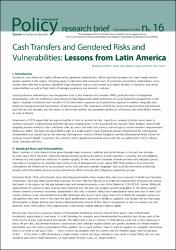Please use this identifier to cite or link to this item:
https://repositorio.ipea.gov.br/handle/11058/15194Files in This Item:
| File | Description | Size | Format | |
|---|---|---|---|---|
| en_IPCPolicyResearchBrief16.pdf | 98.56 kB | Adobe PDF |  View/Open | |
| pt-br_PRB16PT_Transferencias_de_Renda_e_Riscos_e_Vulnerabilidades_de_Genero_Licoes_da_America_Latina.pdf | 99.57 kB | Adobe PDF |  View/Open |
| Title: | Cash Transfers and Gendered Risks and Vulnerabilities: Lessons from Latin America |
| Other Titles: | Transferências de Renda e Riscos e Vulnerabilidades de Gênero: Lições da América Latina |
| Authors: | Holmes, Rebecca Jones, Nicola Vargas, Rosana Soares, Fabio Veras |
| Abstract: | Poverty in Latin America is highly influenced by gendered vulnerabilities. While significant progress has been made towards gender equality in the region, including parity in education and increased levels of economic and political participation, more women than men live in poverty, gendered wage disparities persist, and women face higher burdens of domestic and caring responsibilities, as well as high levels of teenage pregnancy and domestic violence. Social protection interventions have burgeoned across Latin America since the late 1990s, partly because of widespread dissatisfaction with the inefficiency and clientelism that plagued the older generation of social protection programmes in the region. Targeted conditional cash transfers (CCTs) have been a popular social protection response to address inequality and break the intergenerational transmission of extreme poverty. The experience of CCTs has been well documented and analysed over the last two decades, but the extent to which they address the gendered dimensions of poverty and vulnerability remains an area of debate. Proponents of CCTs argue that the regular transfer of cash to women (in their capacity as caregivers) brings about gains in women’s economic empowerment and their decision making power in the household and beyond. Other analysts caution that targeting women reinforces their traditional roles as carers, and that cash alone is not enough to ensure women’s empowerment (Molyneux, 2007). This Policy Research Brief is part of a multi-country study funded by Britain’s Department for International Development and carried out by the Overseas Development Institute (United Kingdom) and the International Policy Centre for Inclusive Growth (Brazil). It examines the extent to which gendered economic and social risks are addressed in CCTs in Brazil, Chile, Colombia and Peru. (...) "A pobreza na América Latina é altamente influenciada pelas vulnerabilidades de gênero. Embora tenha havido um progresso significativo no sentido de garantir a igualdade de gênero na região, incluindo a paridade educacional e o aumento dos níveis de participação econômica e política, há mais mulheres do que homens vivendo em situação de pobreza; as disparidades salariais de gênero persistem e as mulheres enfrentam um aumento das tarefas e cuidados domésticos, bem como altas taxas de gravidez na adolescência e violência doméstica."(...) |
| metadata.dc.rights.holder: | International Policy Centre for Inclusive Growth United Nations Development Programme |
| metadata.dc.rights.license: | O texto e dados desta publicação podem ser reproduzidos desde que as fontes sejam citadas. Reproduções com fins comerciais são proibidas. |
| metadata.dc.type: | Policy Research Brief |
| Appears in Collections: | Publicações do IPC-IG |
Items in DSpace are protected by copyright, with all rights reserved, unless otherwise indicated.

